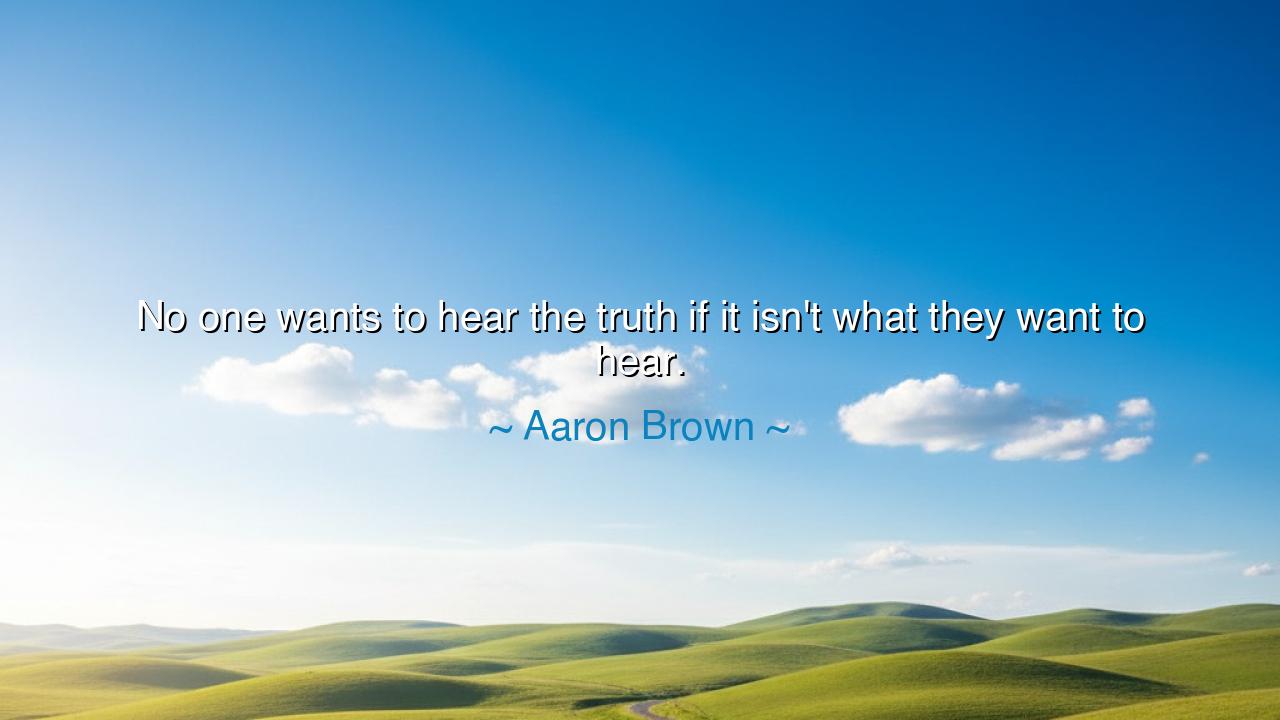
No one wants to hear the truth if it isn't what they want to






Hear the clear and piercing words of Aaron Brown: “No one wants to hear the truth if it isn’t what they want to hear.” This saying reveals the weakness of the human heart—that men and women love the truth only when it flatters their desires, but they turn away from it when it cuts, when it convicts, when it demands change. The ears grow dull when the message is painful, the eyes close when the vision is unwelcome. Yet the truth remains, unshaken, waiting for those brave enough to face it.
The ancients knew this frailty. When the prophet Jeremiah warned the people of Jerusalem that their city would fall, they struck him, mocked him, and threw him into a pit. They wanted to hear promises of peace and safety, not warnings of destruction. But the truth did not bend to their wishes; it came to pass, as it always does. Thus Brown’s words echo through history: mankind resists the truth not because it is hidden, but because it is unwanted.
Consider the story of Galileo Galilei, who looked into the heavens and declared that the earth revolved around the sun. His discovery was plain, his reasoning sound, yet the rulers of his age despised his truth because it challenged their authority. They silenced him, not because he was wrong, but because they did not want his words to be right. In their desire to cling to comfort, they chose to blind themselves. Galileo’s fate is a monument to the reality that unwelcome truths are often met with rejection before they are embraced.
This pattern unfolds again in the life of Abraham Lincoln. When he spoke against slavery, many turned from him in anger. Plantation owners, politicians, even ordinary citizens did not want to hear his message, for it disturbed the foundation of their society. Yet Lincoln, like all who serve truth, stood firm. His words split a nation, but they could not be silenced, for the truth of human equality could not remain hidden forever. The ears of his generation were stubborn, but the future listened, and the chains of millions were broken.
Why is the truth so unwelcome? Because it is a mirror. It reveals the corruption of pride, the deceit of self-interest, the fragility of false dreams. It demands that we abandon what is easy and embrace what is hard. And so the heart prefers illusion, the comfort of lies that soothe, rather than the fire of truth that purifies. But illusions are fragile—they crumble, while truth endures, unchanging, eternal.
The lesson for us is this: do not be like the many who shut their ears when the truth is hard. Train your soul to listen, even when the words pierce, even when the message demands sacrifice. Welcome correction, for it is the path to growth. Seek the counsel of those who challenge you, not only of those who praise you. And when you must speak, do so honestly, even if your words are not what others want to hear, for in the end, the greatest kindness is to give the gift of truth.
Therefore, let this wisdom be sealed upon your heart: the measure of maturity is not the ease with which one hears pleasant words, but the courage with which one receives unwelcome truths. Be the one who listens when others close their ears, and who speaks when others remain silent. In doing so, you will rise above the frailty of human pride and walk in the strength of eternal truth—for though few want to hear it, all are set free by it.






VKPham Van Khoa
Aaron Brown's quote really captures the human tendency to reject information that challenges our beliefs or desires. I often find that people are more willing to accept truths that align with their worldview. But is that truly helpful in the long run? How can we push ourselves to hear the truths that make us uncomfortable, especially if they have the potential to lead to growth or positive change?
ABTruong An Binh
The discomfort people feel when they hear a truth they don't want to hear is so relatable. How often do we avoid feedback or information that doesn’t align with our current views? It makes me think—what would happen if we stopped being so defensive and allowed ourselves to truly hear uncomfortable truths? Could we make better decisions if we were more open to hearing things we don’t necessarily want to hear?
TNThanh Ngan
This quote seems to point out something very true about human psychology—our preferences shape what we are willing to accept. Why do we find it so difficult to accept truth when it goes against our desires or beliefs? What does this reveal about our deeper fears and insecurities? Can we truly grow if we only listen to truths that validate our existing views, or does real growth come from embracing those we don’t want to hear?
T7Thanh Tuyen 7.6
The idea that no one wants to hear the truth if it doesn't match their expectations really resonates with me. It’s as if we’re afraid of facing realities that contradict our hopes or assumptions. Could this be why we often avoid difficult conversations or truths that make us uncomfortable? How can we learn to welcome uncomfortable truths, and why do we resist them so fiercely at times?
MHMinh Hue
Aaron Brown’s quote seems to touch on a universal truth about human nature—most of us prefer hearing what we want to hear, even if it’s not necessarily what's best for us. But does this tendency come from a place of self-protection, or is it a form of avoidance? How can we encourage more openness to truth, especially when it challenges our preconceived notions or desires?